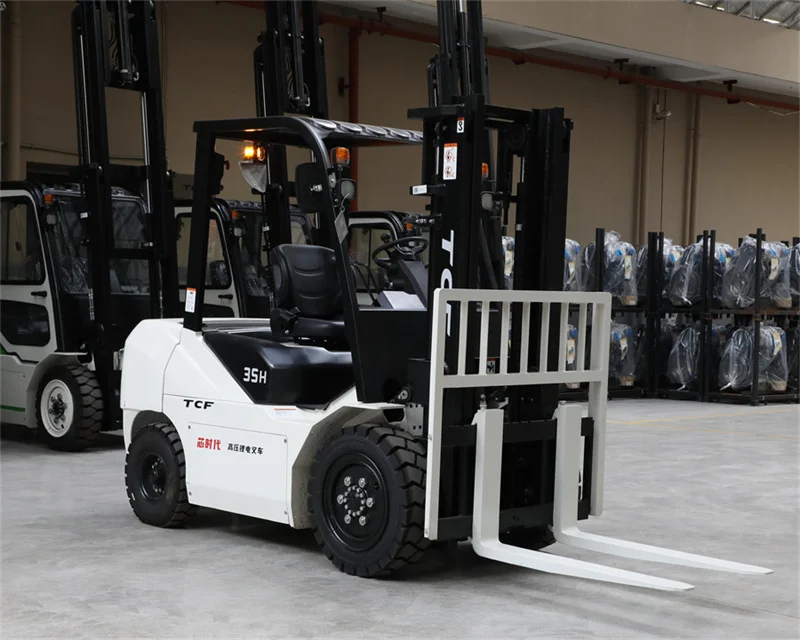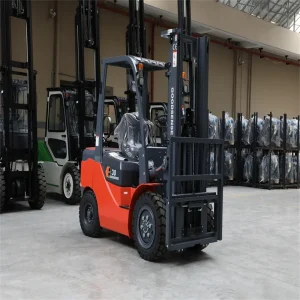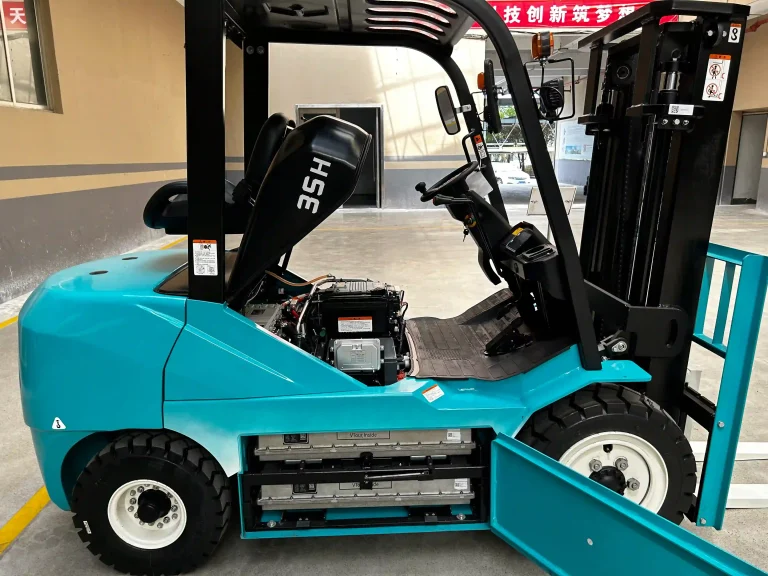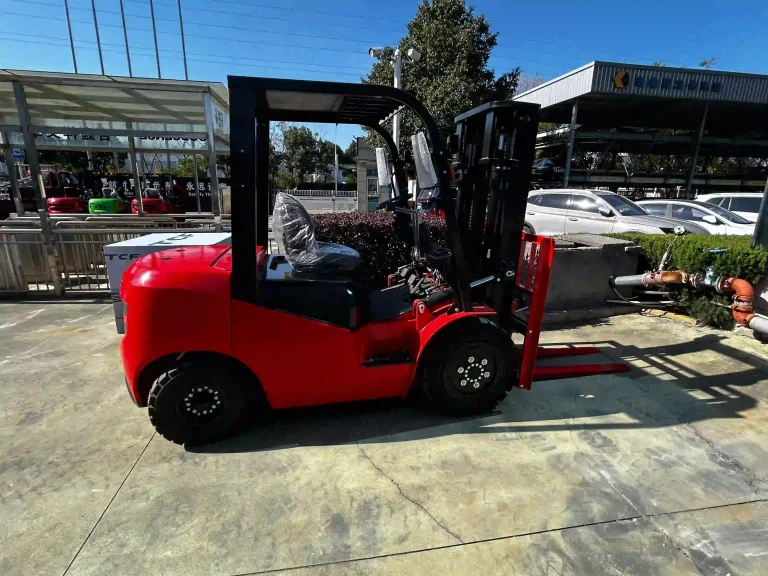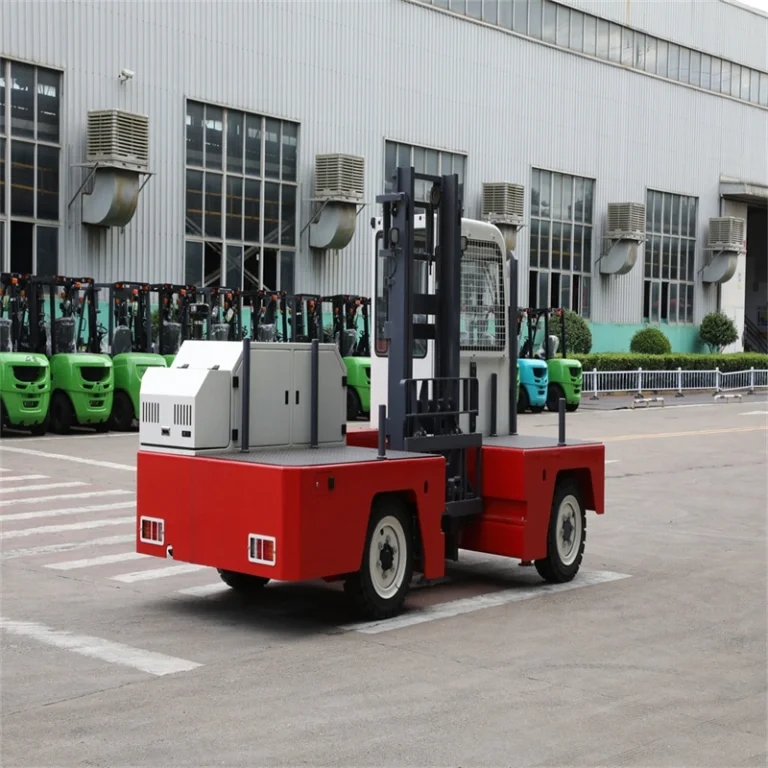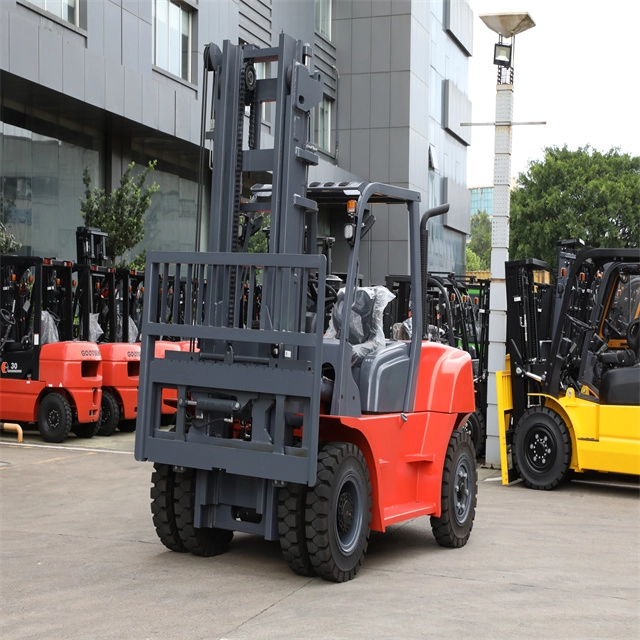Explore the Differences Between Electric and LPG Forklifts
Technological Advancements in Forklifts
Innovations in Electric Forklift Technology
There have been huge technological improvements around electric forklifts. The trucks boast long-life lithium batteries, super-fast charging, and energy-saving technology such as recovering energy during braking. These innovations also aim to increase operating hours and minimize downtime. Electric forklifts also tend to be more ergonomic, have adjustable chairs, and have an easier user interface, which aids in comfort on long shifts. Electric Forklifts have an ergonomic design which includes an adjustable seat and ease of control which makes the comfort of the operator during long shifts higher than ICE Forklifts.
Developments in LPG Counterbalance Forklift Designs
In the same way LPG counterbalance forklift trucks have also been improved. Today dual front tires are common for added stability, and high masts are available to nearly double maximum lifting heights. Because LPG engines output the same amount of power as gas, it means that these forklifts can be used for medium to heavy loads. One of the biggest benefits is fast fuel cycles, and therefore the ability to operate without long downtime.
Environmental Impact of Forklift Choices
Emissions and Air Quality Considerations
Electric forklifts emit no direct emissions during operation which makes them suitable for use indoors where air quality is a key consideration. This in turn means LPG forklifts are a greener option fuel-wise over diesel forklifts ,but are still louder and still release more pollutants than electric models. Nonetheless, they remain appropriate for use in indoor areas with adequate ventilation. However, they are still okay for an indoor area, one with acceptable airflow.
Energy Consumption and Sustainability
Electric forklifts are energy-efficient as they use renewable energy sources such as the lithium batteries used in electric forklifts. They help in achieving sustainability objectives through lesser carbon footprints. On the other hand, LPG forklifts do use fossil fuels, but they are a cleaner-burning fuel than diesel engines. In contrast, LPG forklifts are fossil fuel powered but provide a cleaner burning fuel than diesel combustion engines.
Operational Efficiency in Various Settings
Performance in Indoor Warehousing
Due to their quiet operation and zero emissions, electric forklifts excel in indoor environments. They are very compact so they can fit into tight spaces and be maneuvered easily. Conversely, LPG counterbalance forklifts are capable of operating indoors as well but require proper ventilation as they also produce emissions. Conversely, LPG counterbalance forklifts can be used indoors but must have proper ventilation to eliminate emissions.
Suitability for Outdoor Operations
LPG Forklift: If you are looking for the versatility of outdoor usage than LPG forklifts are all terrain forklifts that work on rough surfaces due to their powerful engines. Unless they have been designed with outdoor use in mind from scratch, electric models are also typically not as well-suited for outdoor use. Even less so if the machine is electric, because electric models typically can not work outside unless engineered that way.
Cost Analysis and Economic Considerations
Initial Investment and Purchase Costs
Price Comparison: Electric vs. LPG Models
Electric forklifts typically have higher upfront costs due to advanced battery technology and electronic systems. In contrast, LPG models are often more affordable initially but may incur higher fuel expenses over time.
Financing Options for Businesses
Both electric and LPG forklifts offer various financing options, including leasing or purchasing plans tailored to business needs. Companies must evaluate long-term benefits against initial costs when choosing between the two types.
Maintenance and Operating Expenses
Routine Maintenance Requirements
Electric forklifts have fewer moving parts and do not run on combustion systems — that means there is less to worry about in terms of maintenance. Battery management is still key, but simpler compared with the routine servicing of LPG engines involving oil changes and filter changes. Battery management is important considering the former basic nature of regularly servicing LPG engines, including changes of oil and filters.
Fuel and Energy Costs Over Time
Electric models are more cost-effective when it comes to energy as they derive power from batteries, while LPG forklifts run on vaporized gas making them prone to changing fuel prices that can affect the operating costs over time considerably. Electric models advantage on the lower part of energy costs thanks in part to operating at a fraction of the cost of a bottle of electricity compared to LPG forklifts, manipulating fuel prices that pose significant operating costs over the long term.
Longevity and Resale Value
Lifespan Expectations for Each Type
Electric forklifts usually have an extended life due to there being a much smaller amount of moving parts that can wear out. On the other hand, if you do things wrong, it can be expensive to change the battery. However LPG models have a higher incidence rate of engine-related problems but are long-lasting and reliable in their lifespan. While it might have more engine-related problems than the petrol version, an LPG model should do the job reliably throughout its life.
Market Trends in Resale Values
The resale value of electric forklifts tends to remain stable owing to growing demand for eco-friendly solutions. Meanwhile, used LPG models may depreciate faster unless maintained meticulously.
Safety Features and Regulations
Safety Mechanisms in Electric Forklifts
Battery Management Systems
Advanced battery management systems ensure safe charging processes while preventing overheating or overcharging incidents which could pose safety risks during operations.
Operator Assistance Technologies
Many electric forklifts are equipped with safety-enhancing technologies such as electronic stability control and hill-start (anti-rollback) protection to help operators remain in control of the lift on difficult terrain. To further safety, electric forklifts are often equipped with technologies that help operators maintain control in difficult conditions, like electronic stability control and anti-rollback protection on slopes.
Safety Protocols for LPG Counterbalance Forklifts
Handling of LPG Tanks
Handling pressurized LPG tanks that power these forklifts requires proper handling protocol as well, thus, adequate training for refill operations is paramount to avoid tank changes leading to potential accidents or leaks. However, the pressurized LPG tanks employed by such forklifts must be handled according to strict guidelines, as a slip-up during a tank refueling or exchange, where they sometimes leak, can cause fires or explosions; to avoid this, operators must be trained properly in safe practices.
Compliance with Industry Standards
All LPG counterbalance forklifts should meet all the rigid industry requirements around emissions levels and safety precautions, with usage often limited to well-ventilated indoor areas; routine inspections keep compliance in check whilst reducing safety hazards based on its market landscapes. LPG Counterbalance Forklifts are subject to the standards set by their industry in terms of emissions levels and operational safety measures; frequent inspections provide assurance that this compliance occurs whilst also avoiding any hazards associated with their usage when used across a variety of environments.
Evaluate Performance Metrics
Load Capacity and Lifting Capabilities
Comparative Analysis of Weight Limits
Electric forklifts are known for their high lifting capacities, and for the hygiene and efficiency needed, the JinChengYu 16-ton lithium battery electric forklift can handle large items, like steel coils and machinery. KION manufactures these forklifts at different weight capacities as per industrial requirements. In contrast, LPG counterbalance forklifts (1.5 tons-3.5 tons) provide a steady power source for handling medium to heavy loads and can be used for a variety of material handling tasks.
Adaptability to Different Load Types
Due to modern control systems and precise lifting ability, electric forklifts are adept at handling many types of loads. These are perfect for small or unconventional items that need careful maneuvering. Conversely, LPG Forklifts deliver strong power output for constant heavy-duty jobs, and they can be relied on for standard palletized products and bulk items.
Maneuverability and Control Precision
Steering Technologies in Electric Models
Electric Forklifts now possess more high-tech steering technologies that allow for better control movement to the driver. Thanks to electronic stability control systems, keep shaking in tight spaces, and regenerative braking results in improved handling dynamics. These characteristics make them well-suited for fast-paced warehouse operations with multiple runs. This is what allows an electric model to excel in handling busy warehouse applications.
Handling Dynamics of LPG Forklifts
Counterbalance Forklift With LPG Hydraulic power assist steering dual front tires protect from Fatigue with some uneven surfaces This provides operators with the ability to control at high elevations while also carrying heavy loads. This means LPG models are appropriate for use both indoors and outdoors for terrain variance.
Choosing the Right Forklift for Your Needs
Assess Business Requirements
The kind of load you handle, your work area conditions (indoor vs out), agency desires will significantly affect which is right for you. Electric models are ideal for environmentally-driven businesses that value sustainability and efficiency indoors, while LPG forklifts provide versatility and consistent performance in diverse environments.
JinChengYu FORKLIFT’s Role in Providing Solutions
Overview of JinChengYu FORKLIFT Products
JinChengYu FORKLIFT offers a comprehensive range of products tailored to meet diverse industrial demands. Their lineup includes both diesel and electric options designed with cutting-edge technology to enhance productivity.
Diesel Forklifts
Each JinChengYu diesel forklift features specific safety elements such as overload protection and anti-tipping functions. Built for the long haul with maximum fuel economy in mind, these models meet stringent emission requirements with their low-carbon footprint. Designed to withstand the test of time while saving on liquid gold, these models are also built to comply with international emission standards to help reduce negative impact on the environment.
Additional Equipment Offerings
In addition to their core forklift products, JinChengYu provides specialized attachments such as clamps and spreaders to accommodate unique material handling requirements. This flexibility allows businesses to customize their equipment according to specific operational challenges.
With a better comprehension of the different strengths and weaknesses of electric against LPG counterbalance forklifts, as well as the specific performance parameters, companies can make decisions that suit their objectives while maximizing productivity. Armed with this knowledge of electric against LPG counterbalance forklifts’ pros and cons as well as understanding relative metrics such as maximum forklift throughput, firms can not only align with their strategic goals when choosing a specific technology path, they can also do so while extracting the highest level of operational efficiency.

